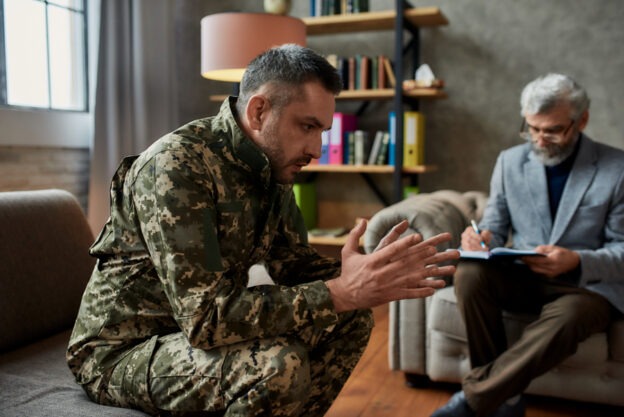While serving on active duty, veterans see and experience things that most of us can’t even imagine. Though some may only serve for a short time, most veterans have dedicated their lives to serving their country and, as part of the job, have experienced situations of extreme stress, physical hardships, and trauma.
Unfortunately, for many of our veterans, these hardships have resulted in long-term challenges, both physical and mental, and, while many seek professional help to address these issues, far too many don’t, resulting in the exacerbation of mental health struggles, as well as substance abuse and addiction issues.
Due to these struggles, access to substance abuse programs for veterans is crucial. For those who helped protect and serve our country, it is never too late for them to get the help they need.
What is the Connection Between Veterans and Addiction?
 As we touched on above, through the course of their careers, veterans experience challenges that few in the private sector can relate to. They see, hear, and experience things that can cause turmoil in even the strongest of people. Veterans often suffer mentally at a disproportionately higher rate as well, including post-traumatic stress disorder (PTSD), depression, and anxiety. Often, whether it’s lack of access to professional care, or feelings of embarrassment or shame, these veterans, upon returning home, may turn to drugs or alcohol as a way to self-medicate and numb the proverbial pain.
As we touched on above, through the course of their careers, veterans experience challenges that few in the private sector can relate to. They see, hear, and experience things that can cause turmoil in even the strongest of people. Veterans often suffer mentally at a disproportionately higher rate as well, including post-traumatic stress disorder (PTSD), depression, and anxiety. Often, whether it’s lack of access to professional care, or feelings of embarrassment or shame, these veterans, upon returning home, may turn to drugs or alcohol as a way to self-medicate and numb the proverbial pain.
Then there’s also the physical side of things.
Many veterans, especially those serving in combat positions, suffer from physical injuries throughout their time served. Depending on the severity of these injuries, prescription medications, specifically opioids may be prescribed to treat these ailments. As we know, opioids are highly addictive and, even when taken only as medically directed, come with an increased risk of dependency and addiction.
When you combine the need for opioids to treat physical ailments, coupled with untreated mental health conditions, it’s no wonder many veterans find themselves in what feels like an endless cycle of addiction.
Why is it Common For Veterans To Suffer From Addiction?
The need for these medications, as well as turning to illicit substances as a form of self-medication are just a few of the reasons why veterans suffer from addiction at a high rate. Some of the other factors that make addiction a common occurrence for veterans include:
The Stress of Transitioning Back To Civilian Life
Returning to civilian life can be extremely difficult for veterans. After years of structured military life, some struggle to find stable employment, reconnect with family and reintegrate into society. Add in both the mental and physical struggles that many veterans also experience and it can be difficult for some to even go about their daily lives in a somewhat normal way. All these issues can lead to feelings of frustration, isolation, and a lack of purpose which, in turn, can increase the chances that they turn to drugs or alcohol for comfort.
Exposure To Trauma
As you may be starting to see, trauma plays a major role in the struggles that veterans often deal with. While on active duty, it’s not uncommon for veterans to experience traumatic events such as combat, violence, and the loss of fellow soldiers. PTSD is a significant issue among veterans, and many turn to substances such as alcohol, opioids, or illicit drugs to self-medicate and try and forget about their past experiences, even if just for a brief amount of time.
Prescription Drug Dependence
This is another one we have already touched on but bears repeating. The physical toll that many veterans go through can leave them suffering from conditions that require the prescribing of opioid medications and other drugs, whether it be for pain management or to treat a condition. These drugs not only come with a high risk of addiction but, as a result of the physical struggles they are going through, many veterans quickly find themselves dependent on these drugs. When that happens, and their prescription runs out or they no longer have access to them, they may turn to harder, street drugs.
What Challenges Do Veterans Face When They Return To Civilian Life?
 A major challenge many veterans face is simply becoming a regular, private citizen again. Whether it be the fact that they no longer have to adhere to a rigorous and disciplined schedule anymore or they are dealing with numerous health problems, for many, the ability to live a “normal” life feels nearly impossible.
A major challenge many veterans face is simply becoming a regular, private citizen again. Whether it be the fact that they no longer have to adhere to a rigorous and disciplined schedule anymore or they are dealing with numerous health problems, for many, the ability to live a “normal” life feels nearly impossible.
Some of the other major challenges that veterans face when they return home from active duty include:
- Having Trouble Finding a Job – Veterans often face difficulties finding stable employment that matches their skill sets. Some jobs may not provide the same sense of purpose and camaraderie that military service did. Additionally, because of both their physical and mental struggles, even when they find a job it may be difficult for them to keep the job.
- Homelessness and Financial Struggles – These employment issues can often lead to even bigger challenges, such as financial struggles and ultimately homelessness.
- Lack of Adequate Support – Whether it’s not having access to professional care or the feeling of isolation and loneliness, many veterans don’t feel that they have the support needed to deal with their struggles. This plays a major role in their decision to turn to drugs and/or alcohol instead of addressing their issues in a more healthy and productive way.
- Family and Relationship Struggles – There is also the family dynamic. Long deployments and the stresses of military life can strain relationships with spouses, children, and friends. Rebuilding these relationships can be challenging and, unfortunately in some cases, unsuccessful.
- Mental Health Struggles – As we have talked about, PTSD, depression, and anxiety are prevalent among veterans. Many struggle to find appropriate mental health care and may self-medicate with drugs or alcohol.
What is the Connection Between Veterans and Alcohol Misuse?
While drugs, specifically opioids, are a major contributor as it relates to addiction issues among veterans, the other common contributor to these issues is alcohol. After all, alcohol is even easier to gain access to than drugs and, unlike prescription drugs, there’s no such thing as an alcohol prescription “running out”. As a result, many veterans turn to alcohol to cope with the daily struggles they experience such as stress, anxiety, PTSD, along with physical pain and discomfort.
While consuming alcohol to deal with these issues may seem relatively harmless, especially when compared to opioids or other “hard drugs”, the fact is that regular alcohol consumption can actually lead to many of the same issues that drugs can, including dependency, addiction, overdose, and even death.
What Are the Statistics Of Veterans with Substance Addictions?
 Just how prevalent are substance abuse and addiction amongst veterans though? Well, more than 80% of veterans who visit a VA hospital or medical facility reported suffering from alcohol abuse. In fact, nearly 65% of all veterans who entered a treatment center did so because of an alcohol addiction, nearly twice the rate of non-veterans.
Just how prevalent are substance abuse and addiction amongst veterans though? Well, more than 80% of veterans who visit a VA hospital or medical facility reported suffering from alcohol abuse. In fact, nearly 65% of all veterans who entered a treatment center did so because of an alcohol addiction, nearly twice the rate of non-veterans.
While we have established that alcohol is the most common form of substance abuse among veterans, drug use is also a major concern. Nearly 11% of veterans who entered treatment did so for heroin use, while more than 6% went to rehab for cocaine use. Many of these individuals benefit from outpatient substance abuse treatment and dual diagnosis rehab, which provides structured support while allowing them to maintain daily responsibilities.
How Do Individuals Use Alcohol to Deal with Stress and Trauma?
For not just veterans, but for people of all walks of life, alcohol is often used as a relaxation tool. Whether it’s having a drink at the end of the day to unwind and relax or going out with friends at the end of a tough week, alcohol is often used as a way to deal with the stresses of everyday life.
For veterans in particular though, alcohol can be a way to escape from the effects of their PTSD, such as intrusive thoughts, nightmares, and general emotional pain.
While alcohol may provide temporary relief, long-term it can actually make PTSD, along with other mental health struggles worse. This can result in the veteran feeling as though they need to drink more and more to numb the proverbial pain, setting off a chain of abuse and addiction.
Free by the Sea Offers Substance Abuse Programs For Veterans in WA
If you or a loved one are a veteran who has been struggling since returning to civilian life, Free by the Sea is here to help. We offer specialized treatment programs designed to help those who have served our country overcome their struggles and live a happy and healthy life.
For more information on our rehab programs, or to get started on the road to recovery, contact us today.
References:
https://www.research.va.gov/topics/sud.cfm
https://pmc.ncbi.nlm.nih.gov/articles/PMC5587184/
https://nida.nih.gov/publications/drugfacts/substance-use-military-life
https://www.va.gov/health-care/health-needs-conditions/substance-use-problems/
https://www.samhsa.gov/data/sites/default/files/reports/rpt23251/6_Veteran_2020_01_14_508.pdf

Dr. Richard Crabbe joined our team in 2019 as our psychiatrist and medical director. He attended the University of Ghana Medical School where he became a Medical Doctor in 1977. From 1978 through 1984, he was a medical officer in the Ghana Navy and provided a variety of services from general medicine to surgeries. He received his Certificate in General Psychology from the American Board of Psychology and Neurology in 2002.
Insurances We Accept
Free by the Sea recognizes the importance of having insurance to receive addiction treatment. Let us work with you to provide you or a loved one with premier addiction treatment services. We accept several private insurance plans. Verify your rehab coverage with us today to ensure you receive the support that you need! Find out if you are covered today!











